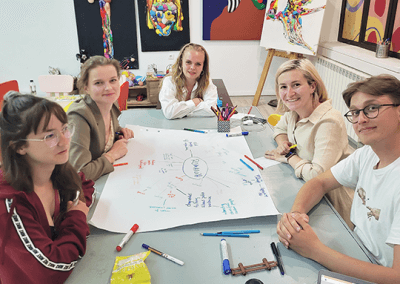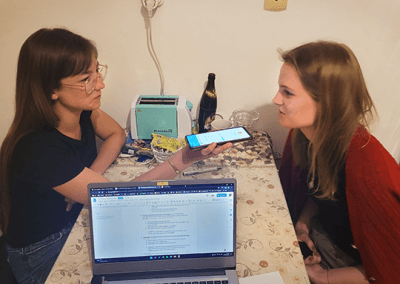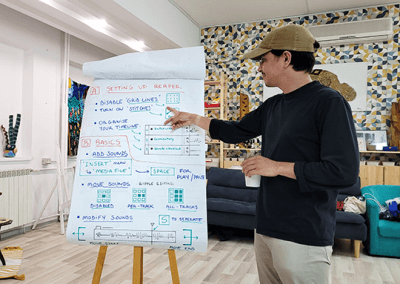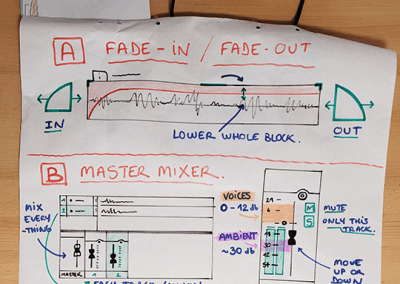Make Your Own Podcast
This project was born based on one passion of one of our international volunteers. In France, Théo is a radio journalist working for the French public radio network. Therefore, one of his personal wishes when he came here was to share his knowledge in sound storytelling to other people in Constanta.
Supported by our organization, he prepared the “Make your own podcast” workshop. In short, the goal of this workshop was to push people to create a short storytelling podcast by themselves. In total, 6 participants followed the 4 sessions of 2 hours each, from the 12th of May to the 9th of June, at the OPEN DOORS cultural center in Constanta.
1st session: Choosing a podcast topic
After everyone presented themselves, Théo explained what a non-fiction storytelling podcast is. In a nutshell, it is an audio-only story about real events. After listening to podcast examples, everyone shared their personal ideas for their own podcast.
Based on that, each participant did a brainstorming exercise on a flipchart paper to learn how to choose a subject specific enough to be told in a 5 to 10 minutes podcast : “Zero Draft“. One participant wrote a theme they liked at the center of a flipchart paper. Then, everybody developed this idea by writing around it:
- 🔵 In blue, everything they find interesting about the subject.
- 🔴 In red, what they would like to know about the topic that they don’t already.
- 🟢 In green, why one detail is important to know, according to them.
The goal was to choose a podcast subject among those complementary ideas. It really helped the participants!
2nd session: Recording and interviewing
Because time management was flawed for that first session, Théo and the participants began the second session by discussing and choosing their definitive podcast topic.
Then, Théo tackled the main objective of this second session: learning how to record and interview people with a phone. First, he explained the technical part: which app to us, how to use it, which codec should be used, etc. Secondly, the participants listened to mock recordings and had to recognize which recording errors they should avoid repeating.
Thirdly, duos of participants interviewed themselves in turns to learn the good practices of recording and be used to cope with difficulties.
- Both of them chose a podcast subject they’d like to be interviewed about.
- Both listed 10 questions they’ll ask.
- After confiscating their list, both had 5 minutes to interview the other and get as as many answers as possible. They had to stay natural, not formal.
- At the end, both of them had to choose one question they didn’t ask. They had to ask it two times, in two different ways, to have two different types of answers.
Now, they had every knowledge they needed to record and interview on their own!
3rd session: Organizing an audio story
For the third session, the participants learned how to organize their recordings as a logic podcast plan. Throughout the whole session, apprentice podcasters had to test each step of making a plan with real recordings (either their own, or mock recordings given by Théo):
- Choosing a storytelling form (either linear, chronologic, thematic or else), based on a given podcast topic.
- Listening to recordings and keeping the most interesting ones, based on a given topic as well.
- Listing each of those recordings in a short sentence and ranking them logically based on the chosen podcast form.
- Filling the gaps between those short sentences with information that needs to be said as a commentary.
Because all the participants didn’t record anything prior to this session, they all worked on the mock recordings, prepared at the last minute to solve the situation. Therefore, the time management of the session was also impacted in a bad way. Always prepare a plan B!
4th session: Audio editing through software
Last but not least, the fourth session’s goal was to learn how to use the basic tools of the audio editing software “Reaper”. On their own computers, the participants used the mock recordings as well to test the software.
- Firstly, they had to create 3 tracks lines (interviews, commentary, sound effects/musics)
- Secondly, they learned how to add, move and cut the recordings according to a storytelling plan.
- Thirdly, they tried to add sound effects and music to the montage.
- Finally, they had to mix the sound levels based on what is more important to hear or not.
Also, Théo explained how they could find copyright-free sound effects and music, and, of course, how to export the whole editing as one audio file at the end. By the way, this last session ended with a snack! 🙂
Conclusion
In the end, even though it was a first both for Théo and the participants, the workshop achieved its objectives: to make people learn every step to create a storytelling podcast. Even if they didn’t create a podcast at the end, they learned how to do it theoretically!
However, Théo sometimes had trouble vulgarizing professional skills without getting too much in details, which impacted his time management. But the small group of participants was benevolent enough to go through these setbacks with him! Thanks everyone! 😊
Location: Open Doors, Constanța, Romania
Dates: 12th, 19th, 30th of May and 9th of June, 2022
Want to see more about our Erasmus events?
Build confidence | Recognize own abilities | Broaden horizons




